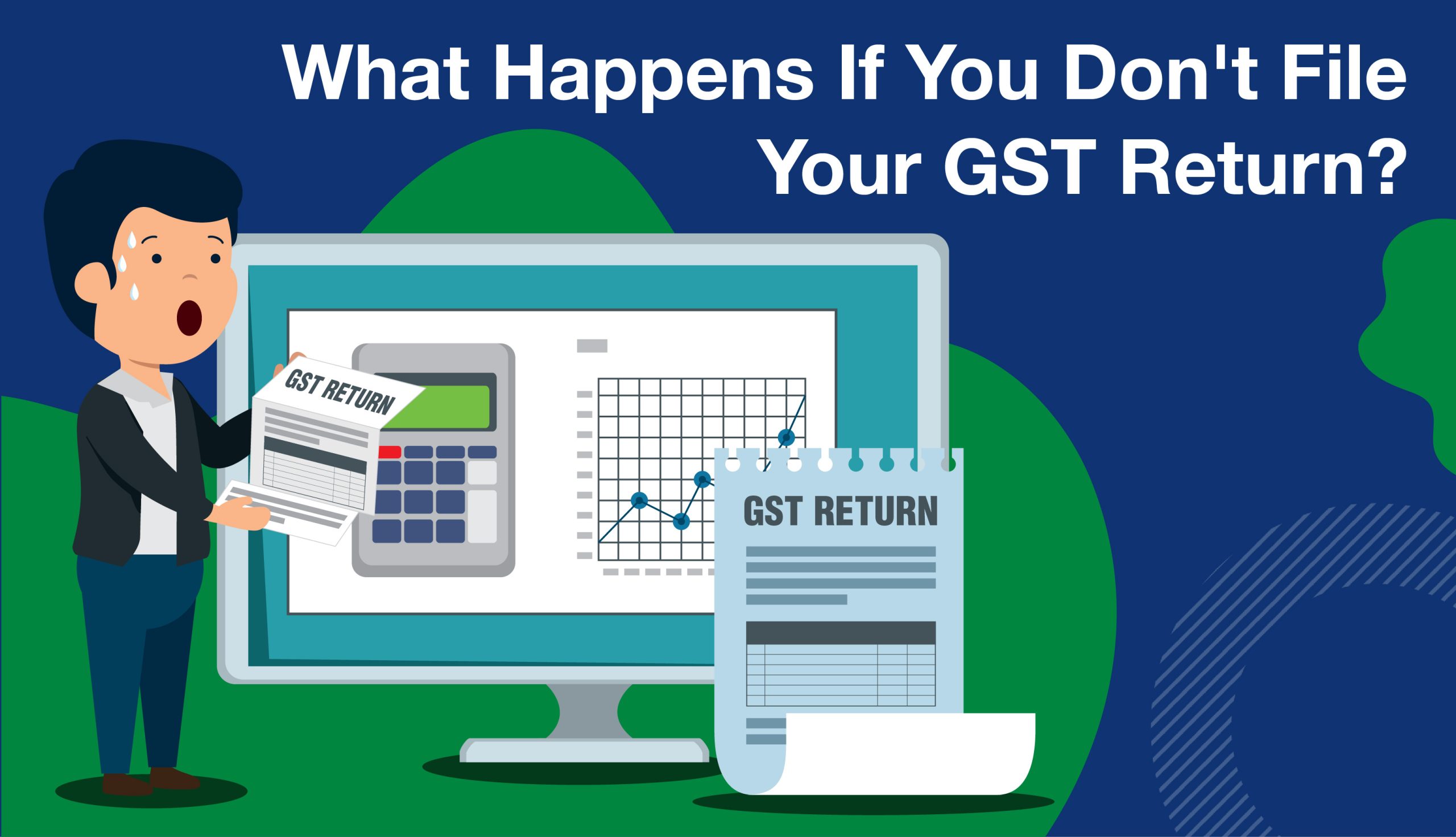The government of India has adopted three primary tactics to motivate people to comply with the GST regime: interest, monetary penalties, recovery, and suspension of GSTIN. This blog discusses the consequences and prosecution that can occur if your GST returns are not filed. To function effectively, tax evaders must face harsh penalties for the indirect taxation regime, known as GST.
Table Of Contents
An Overview
What does GST mean?
What are the penalties for failing to file your GST returns on time?
What is the appropriate amount of late fees?
What Are The Consequences For Not Filing GSTR-1/3B
What does Recovery Proceedings Section 79 mean?
Besides late fees, what are the consequences of late filing of GSTR-1/3B?
Conclusion
How can we help you?
What does GST mean?
The Indian government passed the Goods and Service Tax Act on March 29, 2017, and it took effect on July 1, 2017. The GST (Goods & Services Tax) is a tax across both goods and services. It is an indirect tax that has mostly substituted other taxes such as Excise duty, Service tax, VAT, etc. This will make tax collection easier, minimize double taxation, and increase efficiency.
What are the penalties for failing to file your GST returns on time?
Fortunately, the GST law does not impose any penalties for late or non GST filing of GST returns. Late fees are imposed on GST registered dealers who fail to file GST returns on time instead of a penalty.
What is the appropriate amount of late fees?
In the table below, the late fees for various GST returns are listed. The late fees will increase every day until they reach their maximum cap.
Further, late fees must be paid in full via a debit to the electronic cash ledger. Late fees are not eligible for the input tax credit (ITC).
| Return Type | PAN India Turnover in Previous Year | Per Day under CGST+SGST Act | Maximum Amount under CGST+SGST Act |
| NIL Liability GSTR-1 / 3B | 10+10= Rs 20 | 250+250= Rs 500 | |
| GSTR-1 / 3B | Below 1.5 Crores | 25+25= Rs 50 | 1000+1000= Rs 2000 |
| Between 1.5 to 5 Crores | 25+25= Rs 50 | 2500+2500= Rs 5000 | |
| Above 5 Crores | 25+25= Rs 50 | 5000+5000= Rs 10000 | |
| NIL Liability GSTR-4 Composition dealer Return | 10+10= Rs 20 | 250+250= Rs 500 | |
| GSTR-4 Composition dealer Return | 25+25= Rs 50 | 1000+1000= Rs 2000 | |
| NIL Liability GSTR-5 | 10+10= Rs 20 | 5000+5000= Rs 10000 | |
| GSTR-5 | 25+25= Rs 50 | 5000+5000= Rs 10000 | |
| GSTR-6 ISD Return | 25+25= Rs 50 | 5000+5000= Rs 10000 | |
| GSTR-7 TDS Return | 25+25= Rs 50 | 1000+1000= Rs 2000 | |
| GSTR-9 Annual Return | 100+100= Rs 200 | 0.25%+0.25% of Turnover |
What are the consequences for not filing GSTR-1/3B?
 Provide your consumers with a tax credit denial.
Provide your consumers with a tax credit denial.- Your customer will not be eligible for an input tax credit for the GST you levied on your sales invoices.
- If you don’t file two GSTR 3Bs in a row, you won’t be able to generate an E-waybill.
- If you don’t file two GSTR3B twice in a row, you won’t be able to file GSTR-1.
- Penalties are imposed in the GST for certain specified offences. One of these violations is failing to pay the collected tax amount within three months of the due date. The penalty will be calculated based on the amount of tax collected, with a minimum of Rs. 20,000.
- If you (a regular taxpayer) fail to file a return for six months in a row, the GST Officer has the authority to cancel your GST registration. Before cancelling your reservation, the officer will send you a Notice asking for additional information. You must respond within seven working days, explaining why your GST registration should not be cancelled. On the other hand, officers do not have to start the cancellation process right once if they haven’t filed their GST returns for six months in a row. Your GSTIN will be suspended if officers decide to begin the process of cancelling your GST registration. You cannot provide any Taxable Goods until the suspension is lifted.
Related read: What Are The Types Of GST Registration?
What does Recovery Proceedings Section 79 mean?
The department will take legal action against you if you do not file your GSTR 3B despite repeated reminders and notices. For your convenience, we’ve written the complete procedure below:
- The first reminder is sent three days before the due date to encourage taxpayers to file their returns on or before that day.
- The second reminder will alert immediately after the due date that the return was not completed on time.
- 5 days after the due date, the person receives a notification in Form GSTR 3A asking them to file returns within 15 days.
- 15 days after the notice in form GSTR 3A was served, the Officer may evaluate the situation if the return has not been completed.
- The officer will use their best judgement to calculate the tax liability. The Officer may consider the person’s outward supply information, inward supply information provided by their suppliers, e-waybill information, and other factors. An officer will issue an order in ASMT – 13, and a summary will be uploaded in Form DRC –07.
- The Officer may begin the recovery proceeding under section 78 and the actual recovery under section 79 after 30 days of serving the order in form ASMT -13. Officers are empowered under the GST framework to reclaim tax due from debtors, refund dues, confiscate goods and property, and so on.
It’s worth noting that officers may decide to conduct an investigation. The word “may” indicates that officers are not required to compute the tax payable precisely on the 15th day after serving the notice under GSTR 3A. Officers are free to proceed on any day after the 15-day period has ended. As a result, the precise start date of recovery cannot be determined.
Related read: An Overview On GST And 5 Ways GST Impacts Your Business
Besides late fees, what are repercussions of late filing of GSTR-1/3B?
The following are the repercussions for filing your GSTR-1/3B late:
- If a taxpayer is obligated to pay tax within a certain time frame but fails to do so, interest at the rate of 18% will be charged.
- Only if you utilise the cash ledger balance to pay taxes will you be charged interest. In other words, if you have sufficient input tax credit and do not pay taxes using net banking/challan/balance already entered to the cash ledger, you will not be charged interest.
- In the case of interest, there is no concept of maximum capping.
Conclusion
All GST registered dealers in India must file their GST returns on a monthly, quarterly, or annual basis, depending on the type of business. A registered taxpayer must file their GST returns with the Indian tax authorities describing outbound and inbound supplies. The taxpayer will be penalized with a late fee and interest if their GST returns is not filed on time.
How can ICI help you?
GST filing is a time-consuming process that requires the assistance of a professional. We have dedicated personnel with extensive expertise and experience at ICI who can help you meet all of your GST responsibilities, right from your GST registration to timely compliance, so you don’t get in trouble with the law.
